Difference between revisions of "Andrew Henley 1622-1675"
m (David moved page Sir Andrew Henley to Andrew Henley 1622-1675 without leaving a redirect) |
|||
| Line 3: | Line 3: | ||
[[File:HenleyAndrewSir1.jpg| thumb | Armorial stamp of Sir Andrew Henley (British Armorial Bindings) ]] | [[File:HenleyAndrewSir1.jpg| thumb | Armorial stamp of Sir Andrew Henley (British Armorial Bindings) ]] | ||
====Biographical Note==== | ====Biographical Note==== | ||
| − | Born in [[location::London]], son of [[family::Robert Henley]], | + | Born in [[location::London]], son of [[family::Robert Henley]], chief clerk of the King’s Bench; elder brother of [[crossreference::Robert Henley ca.1624-1692|Robert Henley]] (ca.1624-1692), q.v. Matriculated at [[education::Exeter College, Oxford]] 1639, but did not graduate. Entered at [[organisations::Middle Temple]] 1634, called to the Bar 1646. [[occupation::Sheriff]] of [[location::Hampshire]] 1654; created a baronet 1660; [[occupation::MP]] for [[location::Portsmouth]] 1660; [[occupation::commissioner of sewers]] for [[location::Bedford Level]], 1663, [[occupation::commissioner for recusants]] in [[location::Hampshire]] 1675. He bought the manor of [[location::Great Bramshill]] in [[location::Hampshire]] in 1649 but “was probably never entirely free from debt” (History of Parliament). |
====Books==== | ====Books==== | ||
| − | In his will, Henley directed that all his [[subject::law]] [[bequest::books]] should go to his younger [[beneficiary::son]] [[family::Andrew Henley|Andrew]], and that the rest of his books should be divided between the two [[beneficiary::sons]] [[family::Robert Henley|Robert]] and [[family::Andrew Henley|Andrew]]. Robert (d. | + | In his will, Henley directed that all his [[subject::law]] [[bequest::books]] should go to his younger [[beneficiary::son]] [[family::Andrew Henley|Andrew]], and that the rest of his books should be divided between the two [[beneficiary::sons]] [[family::Robert Henley|Robert]] and [[family::Andrew Henley|Andrew]]. Robert (d.1681) succeeded to the title as 2nd Bart, and after his death, without issue, it passed to Andrew (d.1704). The libraries of “Sr Andrew Henley, Kt and Bart, and an eminent clergyman, both deceased” were sold by [[auction::auction]] in [[location of auction::London]] by [[auctioneer::John Bullord]] in [[date of auction::1700]]; this can only refer to the first Sir Andrew as Andrew the son, and [[personal title::3rd Baronet]], was still alive. The ''History of Parliament'' refers to ongoing financial and other trouble in the family, which may have been the catalyst for the sale. |
The catalogue contains 2603 lots, plus 122 “[[language::Italian]], [[language::French]] and other prints”. It does not distinguish which books came from which source though the 74 lots of [[subject::law]] books are likely to have been Henley’s. Otherwise there were 1558 lots comprising miscellaneous subjects in [[language::Latin]], [[language::Greek]], [[language::French]], [[language::Italian]] and [[language::German]], 907 lots of miscellaneous subjects in [[language::English]], 47 lots of [[subject::classics|classical]] texts described as “authores cum notis variourum” and 17 lots of Roman Catholic [[subject::theology|liturgical]] books. Examples: National Art Library Clements N16. | The catalogue contains 2603 lots, plus 122 “[[language::Italian]], [[language::French]] and other prints”. It does not distinguish which books came from which source though the 74 lots of [[subject::law]] books are likely to have been Henley’s. Otherwise there were 1558 lots comprising miscellaneous subjects in [[language::Latin]], [[language::Greek]], [[language::French]], [[language::Italian]] and [[language::German]], 907 lots of miscellaneous subjects in [[language::English]], 47 lots of [[subject::classics|classical]] texts described as “authores cum notis variourum” and 17 lots of Roman Catholic [[subject::theology|liturgical]] books. Examples: National Art Library Clements N16. | ||
Latest revision as of 06:42, 24 June 2022
Sir Andrew HENLEY, 1st Bart 1622-1675
Biographical Note
Born in London, son of Robert Henley, chief clerk of the King’s Bench; elder brother of Robert Henley (ca.1624-1692), q.v. Matriculated at Exeter College, Oxford 1639, but did not graduate. Entered at Middle Temple 1634, called to the Bar 1646. Sheriff of Hampshire 1654; created a baronet 1660; MP for Portsmouth 1660; commissioner of sewers for Bedford Level, 1663, commissioner for recusants in Hampshire 1675. He bought the manor of Great Bramshill in Hampshire in 1649 but “was probably never entirely free from debt” (History of Parliament).
Books
In his will, Henley directed that all his law books should go to his younger son Andrew, and that the rest of his books should be divided between the two sons Robert and Andrew. Robert (d.1681) succeeded to the title as 2nd Bart, and after his death, without issue, it passed to Andrew (d.1704). The libraries of “Sr Andrew Henley, Kt and Bart, and an eminent clergyman, both deceased” were sold by auction in London by John Bullord in 1700; this can only refer to the first Sir Andrew as Andrew the son, and 3rd Baronet, was still alive. The History of Parliament refers to ongoing financial and other trouble in the family, which may have been the catalyst for the sale.
The catalogue contains 2603 lots, plus 122 “Italian, French and other prints”. It does not distinguish which books came from which source though the 74 lots of law books are likely to have been Henley’s. Otherwise there were 1558 lots comprising miscellaneous subjects in Latin, Greek, French, Italian and German, 907 lots of miscellaneous subjects in English, 47 lots of classical texts described as “authores cum notis variourum” and 17 lots of Roman Catholic liturgical books. Examples: National Art Library Clements N16.
Characteristic Markings
The Clements Collection in the National Art Library includes a 1659 edition of Livy with Henley’s armorial gilt-stamped on the covers.
Sources
- British Armorial Bindings.
- History of Parliament.
- A catalogue of the libraries of Sr Andrew Henley … and an eminent clergyman, 1700, Wing H1449.
